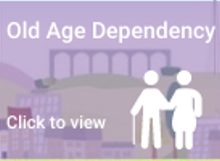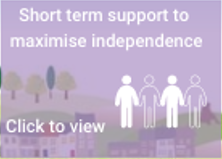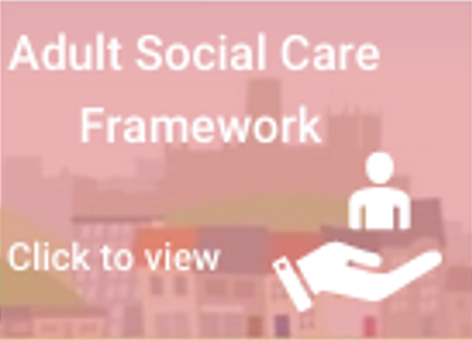Introduction
Adult social care covers all forms of personal and practical help for adults who need extra support to stay healthy, play a part in their community and lead as fulfilling a life as possible. Maintaining independence can be a significant factor in our quality of life. Adult social care services help people to live independently and maintain, or regain, a level of good health and wellbeing.
Social care includes support in people’s own homes (home care or ‘domiciliary care’); support in day centres; care provided by care homes and nursing homes (‘residential care’); ‘reablement’ services to help people regain independence; providing aids and adaptations for people’s homes; providing information and advice; and providing support for family carers.
We know the importance that independence has in helping people to live healthy, safe and fulfilling lives. We work with older people, those with physical or learning disabilities, people living with long-term conditions or mental ill-health, people on recovery journeys from substance misuse, or people recovering from a stay in hospital to help them regain or maintain their independence.
We also offer support and advice to carers, recognising the vital role they play in people’s lives.
See our services here: Social Care & Health – Durham County Council
Our Vision for adult social care:
Adults and their carers receive the care and support they need, when they need it, to help them live the lives they want.
Key Messages:
Data reports:
 |
 |
 |
 |
 |
 |
|---|
 |
 |
 |
 |
 |
 |
|---|
Why is it important?
In England, Local authorities are responsible for assessing people’s needs and funding their care where they are eligible, and for allocating budgets to spend on that care (with some central government grant funding).
In England, local authorities individually decide what they will spend on social care.
Gross current expenditure on adult social care by local authorities in 2022/23 was £23.7 billion. This represents an increase of £1.7 billion (7.9%) from the previous year. (Adult Social Care Activity and Finance Report, England, 2022-23, December 2023). Over three quarters (77.8% or £18.4 billion) of total gross current expenditure was spent on long term support, an increase of £1.9 billion (11.2%) compared to 2021-22.
The King’s Fund calculated that in 2021/222 around half of the expenditure (£26.9 billion) was on working-age adults, with the other half on people aged 65 years or over (Key facts and figures about adult social care, Kings Fund, May 2023). For older people, the majority of spending (65%) was for those who need physical support, while for working-age adults, the majority (68%) was for those with learning difficulties. For older people, the majority of spending (65%) is for those who need physical support, while for working-age adults, the majority (68%) is for those with learning difficulties.
As a local authority, we are required by the government to provide social care for adults. We work under the Care Act 2014, which is the government’s guidance for how we provide care and how we decide who is eligible for care services from us.
We also run our services under The Health and Care Act 2022, which aims to improve health outcomes for all by joining up NHS, social care and public health services at a local level and tackling growing health inequalities. This approach links in with our own commitment to build on strengths and assets in our communities to create the conditions for people to live well, so that our resources target those who need them most.
We want adults in County Durham to know what they can do to stay healthy and where they can go for help and support, to prevent more serious issues.
This includes our work with young adults with a range of conditions from physical to learning disabilities. We give them the support they need to live as independently as possible, while also helping them and their families make the changeover from children’s care to adult care.
As part of our wider works and commitment to champion good mental health for everyone in our County, we are part of the County Durham Mental Health and Wellbeing Alliance, which brings together partner organisations from across the county, to improve the mental health and wellbeing of our residents and prevent mental illness and suicide.
We recognise the absolutely vital role that all carers play in keeping adults in our county safe, healthy and well in mind and body. Knowing that some people are carers without even recognising it themselves, we try to raise the profile of hidden and unpaid carers and encourage them to make the most of the advice, support and assistance we make available to them.
We commission services such as Durham County Carers’ Support to reach out to carers and support them, as without them, the demands on our care system would be far greater.
As the number of older people in this county grows, we need to adapt the types of products and services we offer to meet their needs. What older people and their families want and need is also changing over time and our consultation work as council helps us to get an understanding of this and work collaboratively with residents to shape the services of the future.
This includes looking at how new and emerging technology can help us and the different housing models we can provide. To improve personal choice, we are offering a greater range and choice of housing types for older people to move onto. This is in turn has the added benefit that younger families in our county will then be able to move into those homes that become available when older people choose to move on
Assessments and Audits
In 2024, a Health Needs and Asset Assessment (HNAA) of Adult Carers was carried out by by Durham County Council’s Public Health Team on behalf of the Ageing Well Partnership Board. A summary of which is available here:
Links to Strategies and Plans
Vision 2035 – Health and Wellbeing Board objectives (countydurhampartnership.co.uk)
Durham County Council Council Plan
Evidence base ‘what works’
Assessment framework for local authority assurance – Care Quality Commission (cqc.org.uk)
Transforming care (skillsforcare.org.uk)
Person-centred care: Prevention practice examples and research – SCIE
